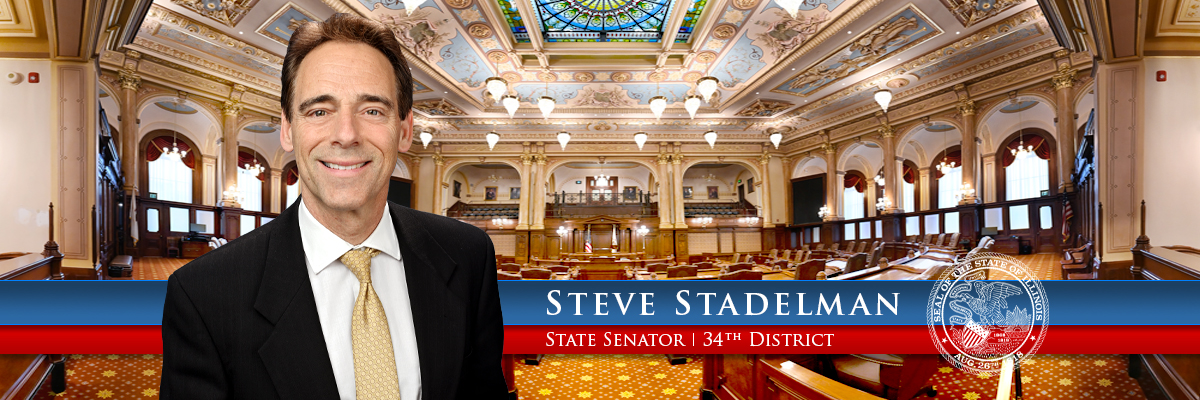Dear Friends,
I'm releasing the op-ed below to newspapers across Illinois because I believe so deeply that good government depends the existence of a viable free press.
Sincerely,
![]()
Steve Stadelman
State Senator, 34th District
Stadelman task force could produce lifeline for local journalism
Democracy dies in darkness. Those words underscore the masthead of The Washington Post every day.
Sadly, the light journalism brings to many communities in Illinois and across the country is dimming. In the past 15 years or so, more than 2,000 newspapers around the country have closed, especially in rural areas.
That means no reporters covering local city council or school board meetings. If people don't get the information they need to know what's going on in their town, they can't make educated decisions when they vote or hold their public officials accountable. Journalists play an important watchdog role in our system.
It’s easy for consumers to forget that media organizations have financial bottom lines, but those who work in journalism or follow the industry closely know the business model, especially for newspapers, is failing.
As a television news anchor and reporter in Rockford for nearly 25 years and a state senator for eight years, I've seen journalism from both sides. You could say a new Illinois law, which establishes the Local Journalism Task Force, is the result of my two careers intersecting. The legislation I introduced and passed this year calls on the task force to assess the state of local journalism and issue public policy recommendations.
I think there needs to be a serious, open and frank discussion on the future of local news and how its future will affect government. As people rely less on traditional news organizations, we've seen a rise in media outlets that push a political agenda. Social media, meanwhile, is far too often the source of false and even dangerous information. Professional news organizations are able to counteract that, helping readers and viewers know the difference.
Dwindling access to local news isn't just a rural issue as many corporate owners of bigger-city newspapers cut staff and close bureaus to save money. While a large city still has many media outlets, we know that in our increasingly diverse society, some voices are not being heard.
There’s also an economic argument to be made. Newspapers like the Rockford Register Star have historically connected local businesses with readers. Without that connection, the local economy and businesses are hurt.
Members of the Local Journalism Task Force include news organizations that represent working journalists, academic institutions that teach journalism or have conducted studies and research into the issue along with state lawmakers and governor’s staff.
Potential solutions considered in other states include creating a fund to bring news and information to underserved communities, providing tax incentives to persuade media outlets to close local news gaps and more money for public broadcasting.
Or there may be no role for state government as the private sector develops new business models. Nonprofit news websites buoyed by philanthropic foundations have sprung up around the country. So too have partnerships with nonprofit groups that allow traditional news organizations to dig deeper and undertake investigations.
A recent article in The Atlantic points out that equal to its watchdog role is the value of local news in establishing a community’s sense of self through stories on church picnics, restaurant openings and closings, school football games and fights to save a historic building or raise money for a cancer victim: “When that tissue disintegrates, something vital rots away. As local news crumbles, so does our tether to one another.”
People want to know what’s going on in the towns and neighborhoods where they live, work and raise families. Their access to news and local information shouldn't depend on their zip code.
Steve Stadelman has represented the Rockford area in the Illinois Senate since 2013.
Local businesses receive more than $400,000 in COVID relief
Eight businesses in the Illinois Senate district represented by Steve Stadelman received $410,000 in the latest round of Back to Business grants. B2B grants range from $5,000 to $150,000 to compensate for revenue losses from the pandemic. Local businesses receiving assistance in this round include restaurants, hotels and salons, representing some of the hardest-hit industries.
In case you missed me on Facebook ...
Steve Stadelman
October 18 at 9:32 AM ·
Great evening of unity as Winnebago County Democrats celebrated our accomplishments and remembered Zeke Giorgi, whose name is still invoked routinely in the State Capitol nearly 30 years since his death. Zeke's grandson and my legislative colleague Dave Vella offered an especially poignant remembrance. Thank you to our keynote speaker, Illinois Comptroller Susana Mendoza, and everyone who helped organize this special event including Carl Wasco and Kathy Tall.



